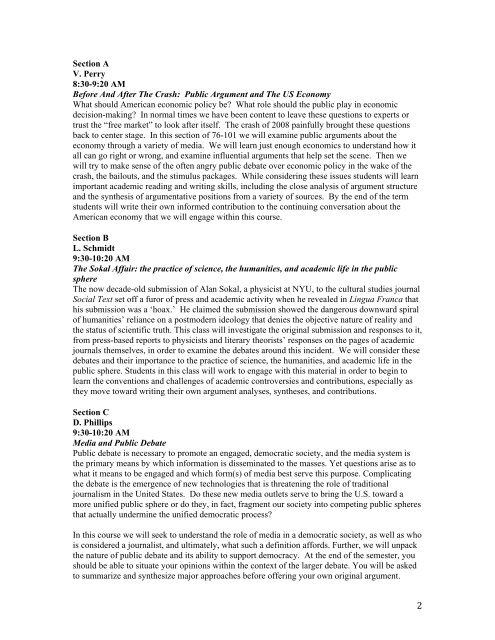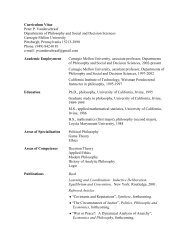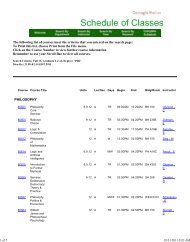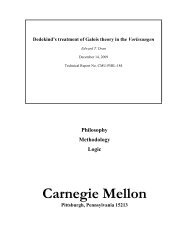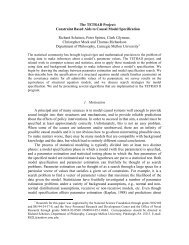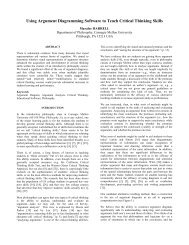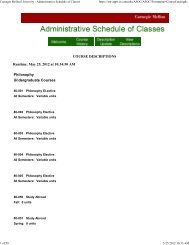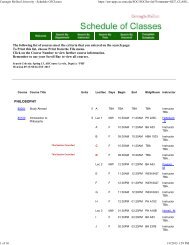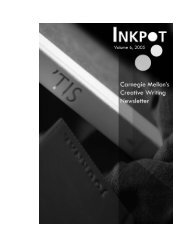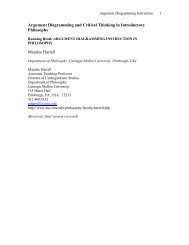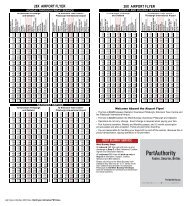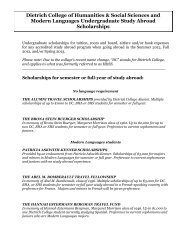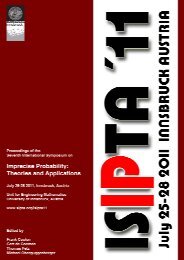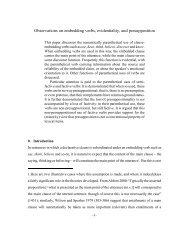First-Year English Program - College of Humanities and Social ...
First-Year English Program - College of Humanities and Social ...
First-Year English Program - College of Humanities and Social ...
Create successful ePaper yourself
Turn your PDF publications into a flip-book with our unique Google optimized e-Paper software.
Section A<br />
V. Perry<br />
8:30-9:20 AM<br />
Before And After The Crash: Public Argument <strong>and</strong> The US Economy<br />
What should American economic policy be? What role should the public play in economic<br />
decision-making? In normal times we have been content to leave these questions to experts or<br />
trust the “free market” to look after itself. The crash <strong>of</strong> 2008 painfully brought these questions<br />
back to center stage. In this section <strong>of</strong> 76-101 we will examine public arguments about the<br />
economy through a variety <strong>of</strong> media. We will learn just enough economics to underst<strong>and</strong> how it<br />
all can go right or wrong, <strong>and</strong> examine influential arguments that help set the scene. Then we<br />
will try to make sense <strong>of</strong> the <strong>of</strong>ten angry public debate over economic policy in the wake <strong>of</strong> the<br />
crash, the bailouts, <strong>and</strong> the stimulus packages. While considering these issues students will learn<br />
important academic reading <strong>and</strong> writing skills, including the close analysis <strong>of</strong> argument structure<br />
<strong>and</strong> the synthesis <strong>of</strong> argumentative positions from a variety <strong>of</strong> sources. By the end <strong>of</strong> the term<br />
students will write their own informed contribution to the continuing conversation about the<br />
American economy that we will engage within this course.<br />
Section B<br />
L. Schmidt<br />
9:30-10:20 AM<br />
The Sokal Affair: the practice <strong>of</strong> science, the humanities, <strong>and</strong> academic life in the public<br />
sphere<br />
The now decade-old submission <strong>of</strong> Alan Sokal, a physicist at NYU, to the cultural studies journal<br />
<strong>Social</strong> Text set <strong>of</strong>f a furor <strong>of</strong> press <strong>and</strong> academic activity when he revealed in Lingua Franca that<br />
his submission was a ‘hoax.’ He claimed the submission showed the dangerous downward spiral<br />
<strong>of</strong> humanities’ reliance on a postmodern ideology that denies the objective nature <strong>of</strong> reality <strong>and</strong><br />
the status <strong>of</strong> scientific truth. This class will investigate the original submission <strong>and</strong> responses to it,<br />
from press-based reports to physicists <strong>and</strong> literary theorists’ responses on the pages <strong>of</strong> academic<br />
journals themselves, in order to examine the debates around this incident. We will consider these<br />
debates <strong>and</strong> their importance to the practice <strong>of</strong> science, the humanities, <strong>and</strong> academic life in the<br />
public sphere. Students in this class will work to engage with this material in order to begin to<br />
learn the conventions <strong>and</strong> challenges <strong>of</strong> academic controversies <strong>and</strong> contributions, especially as<br />
they move toward writing their own argument analyses, syntheses, <strong>and</strong> contributions.<br />
Section C<br />
D. Phillips<br />
9:30-10:20 AM<br />
Media <strong>and</strong> Public Debate<br />
Public debate is necessary to promote an engaged, democratic society, <strong>and</strong> the media system is<br />
the primary means by which information is disseminated to the masses. Yet questions arise as to<br />
what it means to be engaged <strong>and</strong> which form(s) <strong>of</strong> media best serve this purpose. Complicating<br />
the debate is the emergence <strong>of</strong> new technologies that is threatening the role <strong>of</strong> traditional<br />
journalism in the United States. Do these new media outlets serve to bring the U.S. toward a<br />
more unified public sphere or do they, in fact, fragment our society into competing public spheres<br />
that actually undermine the unified democratic process?<br />
In this course we will seek to underst<strong>and</strong> the role <strong>of</strong> media in a democratic society, as well as who<br />
is considered a journalist, <strong>and</strong> ultimately, what such a definition affords. Further, we will unpack<br />
the nature <strong>of</strong> public debate <strong>and</strong> its ability to support democracy. At the end <strong>of</strong> the semester, you<br />
should be able to situate your opinions within the context <strong>of</strong> the larger debate. You will be asked<br />
to summarize <strong>and</strong> synthesize major approaches before <strong>of</strong>fering your own original argument.<br />
2


